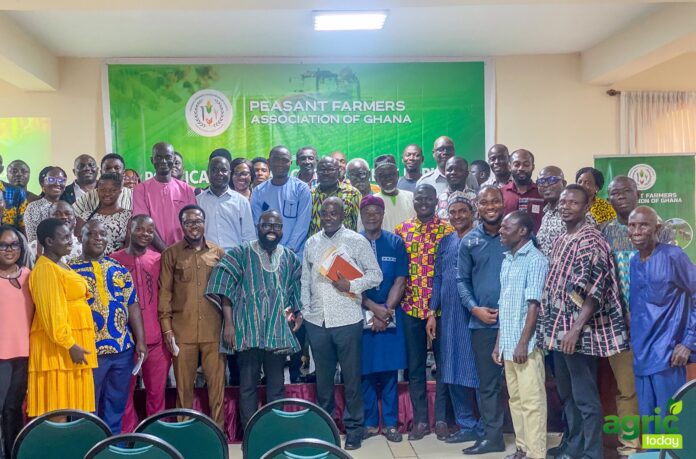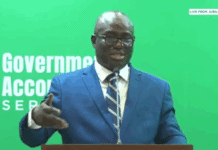Going into the 2024 election, major political parties in Ghana and independent candidates vying for the presidential position have vowed their commitment to improving agriculture in the country.
In a forum organized under the auspices of the Peasant Farmers Association of Ghana, with support from STAR Ghana, under the Social Accountability in agricultural policy framework, in partnership with civil society organizations (CSOs) and other farmer organizations, a Political Parties Accountability Forum on Agriculture was held on Thursday, November 21, 2024, at the Coconut Grove Regency Hotel, Accra.
The major political parties, movements, and independent candidates made available representatives to speak on matters relating to agriculture in their manifestos, which they intend to implement when given the mandate in the coming elections.
The parties that had representation were the National Democratic Congress (NDC), New Patriotic Party (NPP), Movement for Change, and George Twum Barimah, an independent candidate.
Representing the National Democratic Congress was spokesperson for Agriculture/Director of Interparty & CSO Relations, Dr. Peter Boamah Otokunor. The NDC spokesperson for Agriculture affirmed the party’s commitment to making the agriculture sector thrive.
He indicated that “As you may be aware, the NDC, knowing the importance of farmers and all other stakeholders, has set up a department that leads the relations of identifiable groups and so on”.
“So it’s our principle and our policy that moving forward, our implementation of the Resetting Ghana manifesto will be done in direct partnership with you (Farmers). And the PFAG is a significant part of the partners we (NDC) are going to leverage to implement our agricultural for economic transformation agenda.”
“We want to drive development in this country with agriculture, and we believe agriculture is the only sector that, when it grows, impacts both industry and the service sector. So we are going to put all our energies into this sector, to make sure agriculture works, food is available, the farmer becomes profitable, and the farmer is able to take care of himself and his family. Then we are also able to take care of the economy, build our economy, solidify our currency, and be able to compete on the global stage,” Dr. Otokunor further explained.
He highlighted major policies from the NDC manifesto on agriculture that the party will implement when voted into power. He affirmed that the NDC policy, dubbed agriculture for economic transformation, encompasses food availability, food affordability, food accessibility, and utilization of food.
He further noted that convenience is also another factor considered, which is where agro-processing comes in.
He reiterated that the NDC has farmers at heart and urged that coming December 7, all farmers should support the National Democratic Congress, so they can win the elections and offer farmers what is stated in their manifesto.
Speaking on behalf of the New Patriotic Party was a member of the party’s agriculture manifesto team, Moses Anim. He affirmed the commitment the party has for farmers.
He said, “On behalf of Bawumia, we commit to what we have presented as our manifesto. We commit to your interests as well and want to assure you (Farmers) that we will keep engaging with you, so that on implementation, it will be a guide or a reminder. So keep pushing us to ensure that we win.”
He explained their manifesto to the farmers and stakeholders gathered at the forum. He centered the party’s position on agriculture on mechanized farming and irrigation farming, which will help facilitate year-round farming, although he explained a series of policies in their manifesto.
Mr. Courage Nobi, the Deputy Director for Policy at the Movement for Change, also affirmed Alan Kyeremateng’s commitment to agriculture. He stated, “On behalf of Alan Kwadwo Kyeremateng, we commit to formulate agricultural policies based on the plan that we have, that will make the peasant farmer thrive, and will make agriculture attractive, leading to Ghana having food sovereignty. Any policy in the agricultural sector today that is inimical to the peasant farmer will be abolished to ensure a good environment that supports agriculture.”
He also explained the Movement’s policy on agriculture, centering their approach on improving agriculture by ending illegal mining within one year of assuming office. He highlighted that a country that cannot feed its citizens is not a sovereign state.
Independent candidate George Twum Barimah Adu was represented by his vice-presidential candidate, Mr. Nyaaba-Aweeba Azongo, who stated, “Agric for Wealth is our flagship policy. And Agric for Wealth being our flagship policy indicates that we are committed to farmers. We are not here to just present something on agriculture”.
“We don’t have a manifesto; we are guided by the directive principles of state policy, which is a legally binding document that mandates the president upon assumption of office to come out with a blueprint on agricultural development—not just a blueprint, but a planning framework that will allow all of you. We are saying that we are moving from changing the paradigm from planning for you to planning with you.”
He also touted their policies on addressing imbalances in agriculture and using agriculture as a mechanism to drive wealth for all.
Presenting the general overview of the current state of agriculture and its impact on smallholder farmers, the former Executive Director of PFAG, Dr. Charles Nyaaba, highlighted the food security situation in Ghana.
He said that according to the WFP, an estimated 1.05 million people faced acute food insecurity between June and August 2024, an improvement from the 2023 figure of 1.37 million people.
Additionally, Ghana’s food security situation is a mix of progress and ongoing challenges; although the country is self-sufficient in some commodities such as cassava, maize, peanuts, cabbage, millet, yam, and plantain, it still depends on imports for critical staples such as tomatoes, pepper, onions, rice, and poultry (MoFA 2024).
Moreover, in this year, Ghana imports about 70% of onions, costing US$2 million weekly, and 90% of fresh tomatoes, estimated at $400 million from Burkina Faso in 2023. In 2023, the country consumed 300,000 MT of poultry, valued at approximately US$400 million, with 95% of this supply being imported.
According to the Poultry Farmers Association of Ghana, this value is enough to address all the challenges in the poultry value chain.He also highlighted the challenges in the sector, stating that high production costs, including input costs, have increased by more than 30% (fertilizers and agrochemicals). Mechanization costs have also risen to about 30%, along with fuel and energy costs and non-availability of labor.
Other challenges include difficulty in accessing credit, limited irrigation (with a limited number of dams, siltation of existing dams, and poor construction of dams), poor implementation of government projects, the impact of illegal mining (galamsey), which has affected over 2 million peasant farmers, and the impact of climate change (unreliable rainfall patterns, drought, flooding on some occasions, and the emergence of pests and diseases).
Additional issues include poor market infrastructure (leading to high post-harvest losses of perishable commodities such as cabbage, watermelons, cassava, and plantain), a lack of commitment to agricultural development (evident through the removal of import duties on agricultural commodities, high taxes, and the high cost of doing business in the agricultural sector), and poor rural infrastructure (characterized by inadequate feeder roads in many farming communities, limited warehousing facilities, and high energy costs).
There is also limited support in research and development that promotes agricultural modernization.
Meanwhile, the Acting Executive Director of PFAG, in his opening remarks, affirmed the purpose of the forum: “It is our hope that by the end of this forum, farmers, input dealers, civil society, the private sector, and the general public will have had a clear understanding of the plans presented by these parties to help them make informed decisions on election day.”








